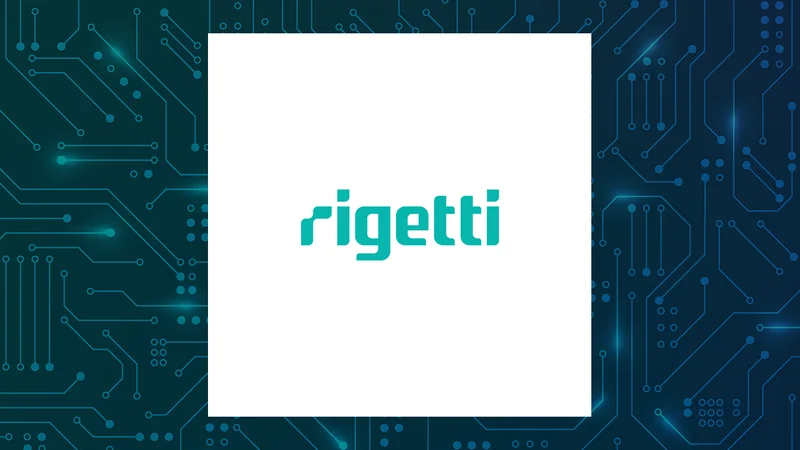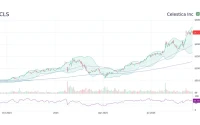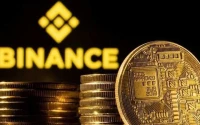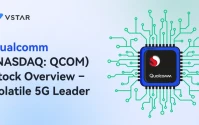Rigetti's Quantum Leap: A Valuation Completely Untethered from Reality
======================================================================
The market has a fever, and its name is quantum computing. Look no further than Rigetti Computing (NASDAQ: RGTI), a stock that has gone from relative obscurity to the talk of trading forums in a matter of weeks. The price action is, to put it mildly, explosive. With the stock gaining around 165% in the last month and its Relative Strength Index (RSI) hitting a blistering 86.8, the technicals are screaming "overbought."
This kind of parabolic move is typically fueled by a powerful narrative. And Rigetti has one. The company is a pure-play in one of the most transformative technologies on the horizon, a field that promises to redefine everything from medicine to materials science. It’s the kind of story that gets investors dreaming of finding the next Nvidia (NVDA) before it became a trillion-dollar behemoth, a dream often sold in articles about 3 Quantum Computing Stocks That Could Make a Millionaire.
The recent catalysts certainly seem to support the hype. The company announced a $5.8 million contract with the Air Force Research Laboratory and secured $5.7 million in purchase orders for its Novera quantum systems. An analyst at B. Riley even boosted their price target from $19 to $35. On the surface, it’s a string of unambiguous wins. But in my world, the narrative is only as good as the numbers that back it up. So, let’s turn down the volume on the hype and take a clinical look at the data.
Deconstructing the Dollars and Cents
When you place the catalysts next to the valuation, a significant discrepancy emerges. The new contracts, while positive developments, total a combined $11.5 million in revenue—some of which won't even be realized until mid-2026. Yet, the market’s reaction has added billions to Rigetti's market capitalization. This is the financial equivalent of using a single drop of rain to justify the price of an ocean.
The disconnect becomes a chasm when you examine the company’s core financials. Rigetti’s revenue for the last period was reported at $10.79M. Based on its recent price surge, its price-to-sales (P/S) ratio has ballooned to an almost unbelievable 1,638x. To put that into perspective, even a high-flying growth stock is often considered expensive with a P/S ratio of 20x or 30x. This isn't just an outlier; it's a number from a different statistical universe. Valuing a company at over 1,600 times its annual revenue isn't investing in future growth; it's a bet on a series of miracles.

I've looked at hundreds of filings for speculative, pre-profitability tech companies, and this is where the story for Rigetti becomes genuinely puzzling. The company’s profitability metrics are, frankly, abysmal. The EBIT margin is -2065%, and the free cash flow is a negative $21.84M. This is a business that is burning through cash at a ferocious rate, funding its operations not with profits, but with shareholder dilution (as evidenced by a recent $35 million issuance of common stock).
This isn't just putting the cart before the horse. It's like valuing the blueprint for a teleportation device at the combined market cap of the entire global airline industry. The potential is theoretically immense, but the tangible, present-day value is being extrapolated to a degree that defies financial gravity. Is it possible that Rigetti becomes a dominant force? Perhaps. But does the current data support its current valuation? The answer is an unequivocal no.
The Broader Quantum Gamble
Rigetti, of course, isn’t operating in a vacuum. The quantum computing space is a high-stakes, high-risk race among several pure-plays, each with a different technological approach. IonQ (IONQ) is championing a trapped-ion method, while D-Wave (QBTS) is focused on quantum annealing for optimization problems. Rigetti’s superconducting technique is the most common approach, also used by giants like Google and IBM, but it requires extreme cooling and faces immense technical hurdles.
The challenge for investors is that this isn't like picking between two competing software companies. It's more like betting on which of three experimental rocket engine designs will not only work but will also become commercially viable and scalable. It's entirely possible that the winning technology hasn't even been fully developed yet, or that one of these companies—or all of them—will burn through their cash reserves long before achieving true quantum advantage.
The current market seems to be treating these stocks less like individual companies and more like lottery tickets. We see similar speculative fervor around stocks like Quantum Computing Inc (QUBT), which also saw its stock jump on an analyst upgrade. The momentum is infectious, but it’s detached from the underlying business reality.
While Rigetti’s gross margin is about 40%—to be more exact, 40.6%—that figure is rendered meaningless by the colossal operating expenses required to fund its R&D. The company’s reported asset turnover of zero is another major red flag, suggesting its substantial asset base isn't yet generating any meaningful revenue. While a high current ratio (reported at 41.6) indicates short-term stability, it’s not a product of operational success. It’s the signature of a company that has recently raised cash and is now in the process of spending it. The question is, can they reach orbit before the fuel runs out?
The Math Simply Doesn't Compute
Let's be perfectly clear. The technology Rigetti is developing is fascinating, and its potential impact is undeniable. But a stock price is not a vote for a cool idea; it's a claim on future cash flows. The current `RGTI stock price` reflects a future so perfect and so certain that it leaves no room for error, competition, or the brutal realities of technological development. The valuation is pricing in not just the successful invention of a revolutionary technology, but also its flawless commercialization and market dominance. That’s not an investment; it’s a fantasy. The numbers on the balance sheet are telling a quiet, cautious story of immense cash burn and speculative hope. The numbers on the stock chart are screaming a loud, frantic story of pure momentum. In my experience, when those two stories diverge this dramatically, it's gravity that always has the final say.









